The final season of Orange Is the New Black lands on Netflix today; before we publish our review, our TV Team decided to take a look back at the ways this revolutionary show brought us together and tore our hearts apart.
Are you still watching Orange Is the New Black? Why/Why not?
Valerie Anne: I’m not. I tried to watch Season Five, I did, but I just could never get past Poussey’s death. It didn’t help that they were trying to make me empathize with the guard who killed her, while also trying to give Tiffany’s rapist guard a redemption arc. It was hurting me too much for even Alex Vause to heal me, so I had to let it go. Which isn’t something I do often or lightly.
Drew: I am still watching. Despite the flaws, despite the arcs that felt like a real chore to watch, despite certain decisions that have angered me, I love these characters too much to ever give up on them. And it’s still one of the few shows with this many queer women. I’ll also say, even at its worst, there has never been a season of the show I didn’t still find some worth in. It will always be a treat to watch these actors if nothing else.
Natalie: I am not. I made the mistake of logging onto the internet on the weekend that the fourth season dropped and someone added a comment on our Bury Your Gays tally that included spoilers about Poussey’s death. I happened to see it on the frontpage sidebar and thought, “Nope, I’m not doing this to myself.” I’d already been wavering about continuing to watch after they sent Sophia to the SHU at the end of the third season but killing Poussey felt like a bridge too far. I never watched another episode of OITNB after that.
Heather: Oh wow, Natalie, that is EXACTLY what happened to me, down to my doubts about Sophia in SHU and the comment in the sidebar. I also haven’t watched since then.
Carmen: I am still watching! It’s complicated, to say the least. Like Natalie and Heather, I was also spoiled about Poussey’s death the weekend the fourth season dropped. A friend messaged me “It looks like OITNB added another dead lesbian to the list” – and let’s just say, I knew it wasn’t going to be Piper or Alex, for obvious (white) reasons.
I still watched the fourth season though, and it was painful. There’s never been a television death that broke me like Poussey’s. Never, not once ever. I mourned her. I still can’t watch her, even in old episodes, without a visceral pang in my chest. Which is to say, for at least a year after the infamous death scene I swore off the show completely and was 100% committed to burning everything Orange is the New Black touched to the ground and salting the earth upon which it stood. But something changed for me. I decided I wanted to stay a part of the critique, of the conversation.
I’d once loved this show so deeply and openly, and to be honest I’ve still found ways to love it even now. It’ll never be the same as the earlier seasons, there’s a hurt that lingers underneath that I can’t shake. But I’m glad I watched until the end. Orange is the New Black was an important part of my coming of age – as a black queer woman in my 20s, and now in my 30s as a television critic and writer. I wouldn’t be here doing this job if it wasn’t for that show. For that I am thankful.
Riese: I am. I’m also right there with Carmen — Poussey’s death, in my opinion, was the most devastating and most poorly handled TV character death in queer television history. I kept watching because it still has a cast that is mostly women and racially diverse with multiple queer characters, and because it’s full of incredible actresses doing work that is very valuable to them. I want to remain part of the cultural conversation around it.
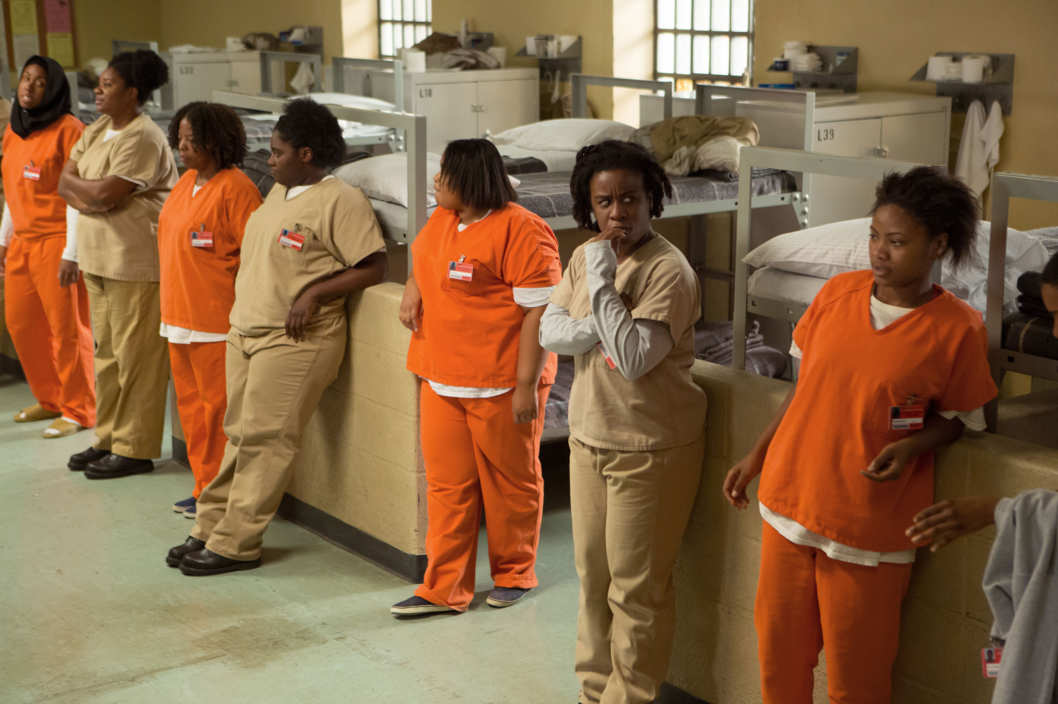
If you are still watching, what are your hopes for this final season?
Drew: I don’t know! Usually I go into a show’s end knowing whether I want it to do something bold or do something crowd-pleasing. But with Orange I just don’t know. I think I don’t trust them to do something bold, but am hoping they prove me wrong. The problem with subject matter like this is it would be disingenuous to end on an entirely happy note. We can’t pretend like prisons have been abolished, we can’t even pretend like prison abolition is even in the near future of this country. But still I hope the end is not too maudlin. I hope they find a way to respect these characters as human beings and not just political talking points.
Carmen: Well, I’m the exact opposite! I know what I want – for Natasha “Taystee” Jefferson to be exonerated.
I want OITNB to take their final bow by giving respect to organizations like The Innocence Project and those others who are already doing the work of changing the prison industrial complex, improving the quality of life for those incarcerated, and working to free those who have been wrongfully imprisoned. There’s a lot of ways that Orange is the New Black brought mainstream national attention onto the lives and stories of these women, but the show also did a lot of damage. The most just thing they can do at this point is to acknowledge their hurt and move the spotlight that’s been so graciously bestowed upon them to those organizations and voices that need it and deserve it most.
Riese: I want Taystee exonerated too. There’s no such thing as justice for Poussey, but it’d be cool if they at least aimed for it. I’d love to see Sophia finding happiness on the outside. Honestly at this point I think a lot more about what I hope I don’t want to see.
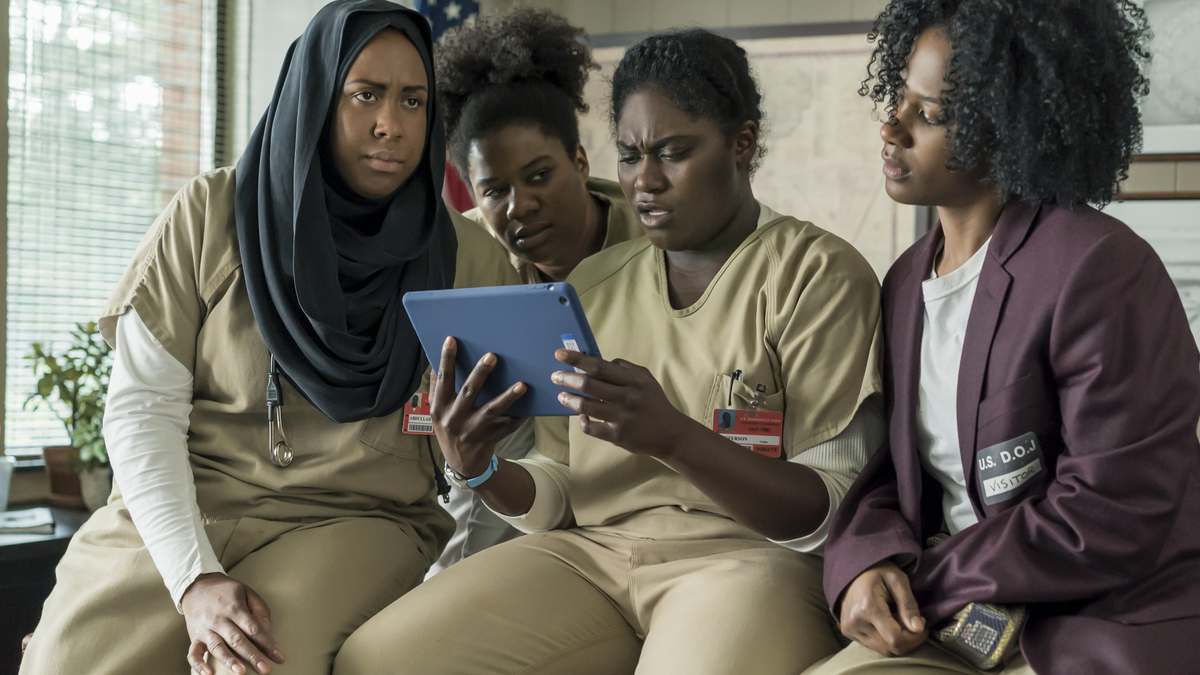
Do you remember how you felt when you watched the first season of the show, back in 2013? What struck you about it then?
Valerie Anne: I remember being struck by how centered around the women it was. And how… flawed everyone was. There were no shiny princess characters. Piper sucked. But that was okay. The whole point was kind of her figuring out that she sucked. It was immediately obvious that this was a queer show, and it as immediately obvious that this wasn’t a queer show about a bunch of skinny white girls from LA. It won’t say it was REAL but it was raw and it was new.
Carmen: Valerie took the words right out of my mouth! “It was immediately obvious that this was a queer show, and it as immediately obvious that this wasn’t a queer show about a bunch of skinny white girls from LA.” I spent my college years watching The L Word on smuggled hot pink DVDs, YouTube compilations, and cable reruns that I quickly erased from our family’s queue so no one would know I was gay – which is to say that I learned a lot about queerness from women who looked nothing like me.
In the Season One finale of Orange is the New Black, Samira Wiley sings “Amazing Grace” during the Litchfield Christmas pageant. I melted, and then I wept. I’d never seen it before. I had never seen the low buzz cut and swag and soft eyes of a black butch like the black women and masc folks I’ve loved in my own real life. I’d never seen someone capture their tenderness, when so often other stories about black butches (the few that exist!) focus on their hard exterior. Between that – and literally everything about Laverne Cox and Sophia – I knew OITNB was different. It was going to change the game.
Drew: I actually didn’t start watching in 2013! I caught up around season three. I’d originally skipped it because of how focused on queer women I knew that it was. That was such a large part of the cultural conversation even in my straight/closeted circles.
Carmen: Awww, Drew!
Drew: When I did finally catch up, a lot of people I knew had already stopped watching. But, ever the contrarian, I actually liked the show more as it went along from season one to season three. I appreciated how much of an ensemble the show became and I was thrilled to see characters who I’d never before seen on TV pull focus from the more obvious protagonist of Piper.
Natalie: I was really nervous about watching this show to be honest. I’d stopped watching Weeds, Jenji Kohan’s previous series, out of frustration over how one dimensional the characters of color were, so I walked into OITNB carrying that weariness. Not Ryan Murphy, post--Glee, level weariness but pretty close. I worried that Piper was just going to be the new Nancy Botwin and I didn’t want to see that. Thankfully, that’s not the show Orange turned out to be. I remember being so relieved.
But beyond the stories, I felt the seismic shift that OITNB created right away: Both in terms of how we consume television and in terms of what was possible in this new medium.
Heather: I was lounging in bed on a Saturday the weekend Orange debuted and I just sort of languidly pressed play on it — and I vividly remember shooting up like a bolt when, three seconds into it, Piper and Alex were making out naked in the shower. That’s the kind of thing that, before that moment, we’d have known was coming for weeks or months in advance because One Million Moms or whoever would have been protesting it and networks would have been flipping out about ad sales and it’d have been this big lesbian controversy. But Netflix doesn’t run ads. They don’t have Standards & Practices like broadcast networks. So it just happened. And that was only the beginning. I am not actually much of a binge-watcher, unless I’m forced to be (I like to savor my stories), but I blitzed through that first season in a single sitting.
Riese: We watched it at our Senior Staff Shakedown in 2013, ’cause we’d heard buzz, and we turned it on and within five minutes the protagonist was making out, naked, with a woman in a shower. This was UNPRECEDENTED. Then it turned out she wasn’t even the only queer character? And it had this incredibly diverse cast of women, women of all ages and races and sizes, many with theatrical chops? AND it cast a black trans woman to play a black trans woman? AND it addressed an issue that I’ve been pretty passionate about for 15 or so years — the utter despicableness and thorough racism of our criminal “justice” system and the prison industry in the United States. Suddenly conversations I tried to have around mass incarceration and injustice were easier to start — people had an inroad.
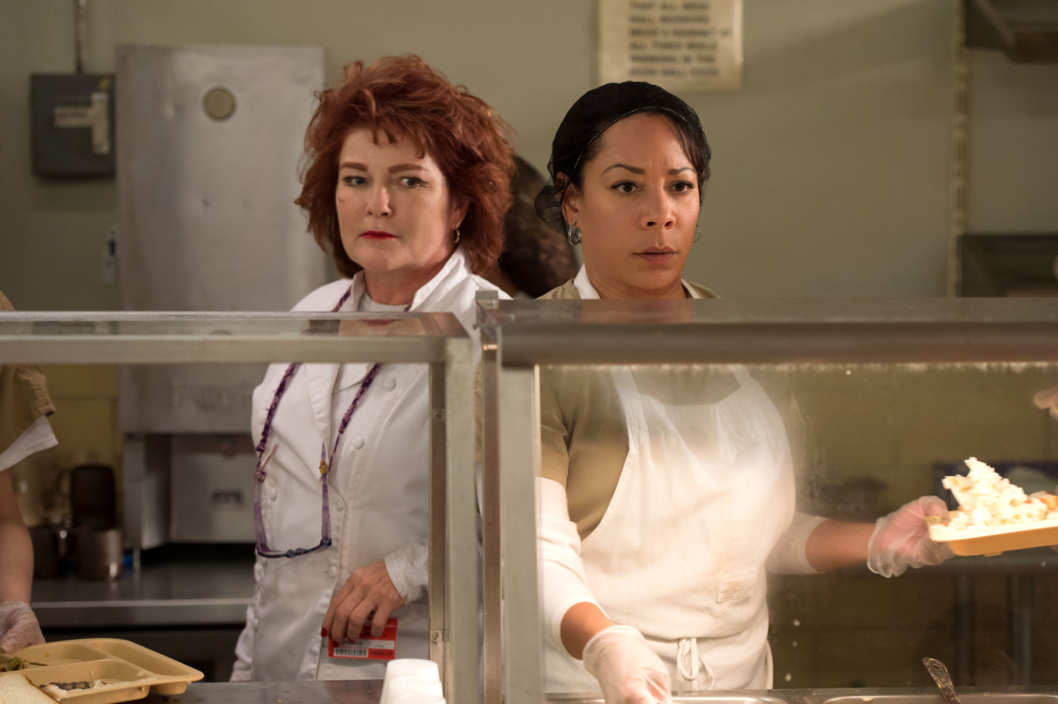
Now, here in 2019, what can you look back and see that OITNB was a catalyst for changing, both in terms of broader pop culture and queer TV specifically?
Valerie Anne: I think Poussey’s death sparked a lot of necessary conversation. I don’t think it had to happen, though. (#ForeverMad) I will say, this show was one of the rare shows that were part of queer canon and queer vernacular but that also a lot of straight people I knew watched? It bridged a gap few shows seem to succeed in bridging.
Heather: Yeah, that is a really good point! I can’t think of any other show (besides I guess Game of Thrones) that my straight friends were talking about as much as my gay friends.
Riese: I think one of the things Poussey’s death did for the critical conversation was really drive home the need to have a writers’ room as racially diverse as the characters they were writing for. It’s inexcusable not to. And I think the queer presence in the writers’ room (including Piper Kerman as a consult to the program) is part of why we got so many authentic queer stories. But we have to push for more than that — it’s not enough to tell good lesbian/bisexual stories if you aren’t doing right by your poc and qpoc and/or trans characters.
Drew: There’s a lot to critique about the show itself, but the overwhelming positive impact Orange has had on television is undeniable. This was only Netflix’s second breakout show and its first breakout, House of Cards, was directed by David Fincher and had two movie stars. Orange was an ensemble led by women, mostly queer women, largely women of color, including a queer trans woman of color played by an actual trans woman. And this is the show that made Netflix the machine that it is today!
I think one of the reasons TV is so far ahead of film in regards to representation is because this new wave of streaming television is intrinsically tied to this show. It makes it all the more painful that Netflix has become so disloyal to other shows pushing similar representational boundaries. Thankfully the rest of the landscape is picking up that slack.
Natalie: Just to add to Drew’s point about House of Cards. It was Netflix’s first breakout show — it debuted five months before Orange — but that was a show very much built to succeed on network television. House of Cards would’ve been the perfect compliment to HBO’s The Newsroom — both had two white movie stars as leads with prominent white male executive producers — but in the end, Netflix outbid HBO for the show.
Orange, on the other hand, was very much crafted to exist in this space. Even though there was some network interest in the show — neither HBO nor Showtime would go to series without seeing a pilot first — I’m not sure that it could have existed anywhere else…and I think, ultimately, that becomes the way that Netflix is defined in the early part of the streaming era.
With respect to the show’s impact on queer TV specifically, when it debuted back in 2013, I think Orange really set a new bar for the portrayal of lesbian sex. Alex and Piper in the shower. Poussey and her German girlfriend failing at scissoring. Big Boo’s strap-on scene. Those sex scenes felt raw and honest. They were true to the characters participating in them and reflective of the actual sex that queer women have…and never did it feel like it was done to appease the male gaze. I hope that other queer TV aspires to achieve or exceed what Orange has done.
Carmen: I was watching Pose this week and I thought to myself, “I don’t know if this show would be here if OITNB hadn’t existed.” Maybe that sounds like a large claim, but I definitely think Pose, with the largest trans women cast (most of whom are black trans women and trans women of color) and Janet Mocka as its black trans woman writer/director/producer, wouldn’t have happened without Laverne breaking down doors. Laverne Cox became the first out trans actress to be nominated for an Emmy Award because of OITNB. The platform that the show gave her – she ran with it. She changed the scope of how we see and listen to trans women’s stories. And that’s not to say that other trans women haven’t fighting before Laverne Cox, and won’t continue to fight after her! It’s just an acknowledgement of what she was able to do with the baton while it was handed to her.
I also agree with Natalie about OITNB’s depiction of sex on screen. And with Drew that OITNB built the backbone of the Netflix machine as we know it today (though Netflix’s continued insistence on canceling other narratives that emphasize stories of queer women or women of color is worth signifcant pause). I also think that OITNB helped usher in a new era for women’s stories on television more broadly. I don’t know if we have Big Little Lies or The Handmaid’s Tale without Jenji Kohan proving that a cast full of women can garner both critical acclaim and financial success. Before Orange is the New Black, so-called “prestige television” was mostly associated with white men anti-heroes like Tony Soprano, Don Draper, or Walter White. I think the show helped change that.
Riese: For sure, it was the first time that we saw a show with a queer protagonist and a mostly all-female ensemble that got not only mainstream critical acclaim, but huge audience numbers. It was so heartening to see fandom rallying around a group of actors who are, with a few notable exceptions, mostly not twenty-or-thirtysomething thin white cis femme straight women.
Heather: These are all excellent points, and I agree with all of them. The one thing I’ll add is that Orange also drastically changed what queer, trans, and POC viewers demanded from television. Only a couple of years before Orange landed, Fox tried to pass off Brittany and Santana, like, touching necks like a couple of giraffes in a nature documentary as kissing on the mouth. That Orange was willing to just go there without apology or explanation in its sex scenes changed our expectations, even for non-streaming shows. It also, of course, skewered the argument about “Oh but there just weren’t any POC/trans actors, we tried.” Orange was busting at the seams, out of the gate, with talent no one had ever heard of, but talent so standout that they were pulling down Emmy and Golden Globe and Screen Actors Guild and Television Critics Association Awards over the known cis, white actors on the show. It takes one show to fuck up the oppressive narrative.

What are some standout storylines to you (in a good way)?
Valerie Anne: I’m an emotional masochist so I loved the angst of the Piper/Alex relationship. I like that they were both kind of shitty to each other but both extremely drawn to each other. I love that they hated each other but couldn’t keep their hands off each other. It was toxic and terrible and not something I would ever want it real life but gosh was it fun and sexy to watch.
Drew: I don’t even know how to begin answering this question. There are so many characters, so many seasons, so many storylines! I think as a result, I just think of long-term relationships, like Taystee and Poussey’s friendship which is pretty easily the highlight of the show as far as I’m concerned. Also Flaca and Maritza’s friendship! And Nicky and Red’s mother/daughter friendship! Not to take away from all the amazing lesbian sex, but there were so many beautiful platonic relationships between women on the show and I think those have stuck with me most.
Natalie: So, admittedly, I’m a little hamstrung by having not watched the show since Season Three but thinking back to what I did watch, I think the relationships really connected me to the show. Taystee and Poussey’s friendship really stands out because no matter the circumstances, queer girl falls in love with her straight best friend is #relatablecontent. I loved the fight between Aleida and Gloria in the second season over who could be the best mother to Daya.
But I think my favorite character arc was Suzanne “Crazy Eyes” Warren. That character could’ve gone wrong in about a thousand different ways but the writers threaded the needle so finely and Uzo Aduba just imbued the character with so much heart that she became impossible not to cheer for.
Carmen: I think it’s all the little moments, you know? The friendship between Taystee and Poussey will stay with me forever for all the reasons Natalie just highlighted. But also – Maritza and Flaca!! Daya and Aleida!! Red and Nicky!! Big Boo and Tiffany!! Orange is the New Black absolutely excelled at telling stories about how women related to each other, built each other up, have each other’s back, and yes, cause each other pain. Maybe that’s cliché, but not a lot of shows grasp those nuances and showcase our humanity. Even in its worst moments (and there have been a lot of worst moments) – Orange never stopped putting women at the center of its narrative.
Heather: I’m with all of you about Taystee and Poussey. One of my all-time favorite fictional friendships ever. That funeral for the books will live in my heart forever. I enjoyed Piper and Alex in the first season because I, too, am a sucker for that “Why do you feel so inevitable to me?” kind of gay angst. (I just hated Piper, and not in a good way, by season two so I had hard time rooting for her much after that.) Like Natalie, though, my favorite is Suzanne’s storyline through season three. It was a singular joy to watch Uzo Aduba breathe so much heartbreak and humanity and humor into that characters.
Riese: Yep, Taystee and Poussey’s friendship for sure! Poussey’s relationship with Soso. Anything involving Watson / Black Cindy / Poussey / Suzanne / Taystee’s friendship group. Sophia’s friendship with Sister Ingalls. Any time the women were actually allowed to do some version of “thriving” within the prison — Rogers’ theater class, Suzanne’s fan-fiction, Cindy and Flaca’s radio show with Flaca, Red’s garden, Sophia’s salon. I think Big Boo’s flashback episode was pretty incredible in terms of butch representation. Cindy’s conversion to Judaism was a HUGE one for me too.
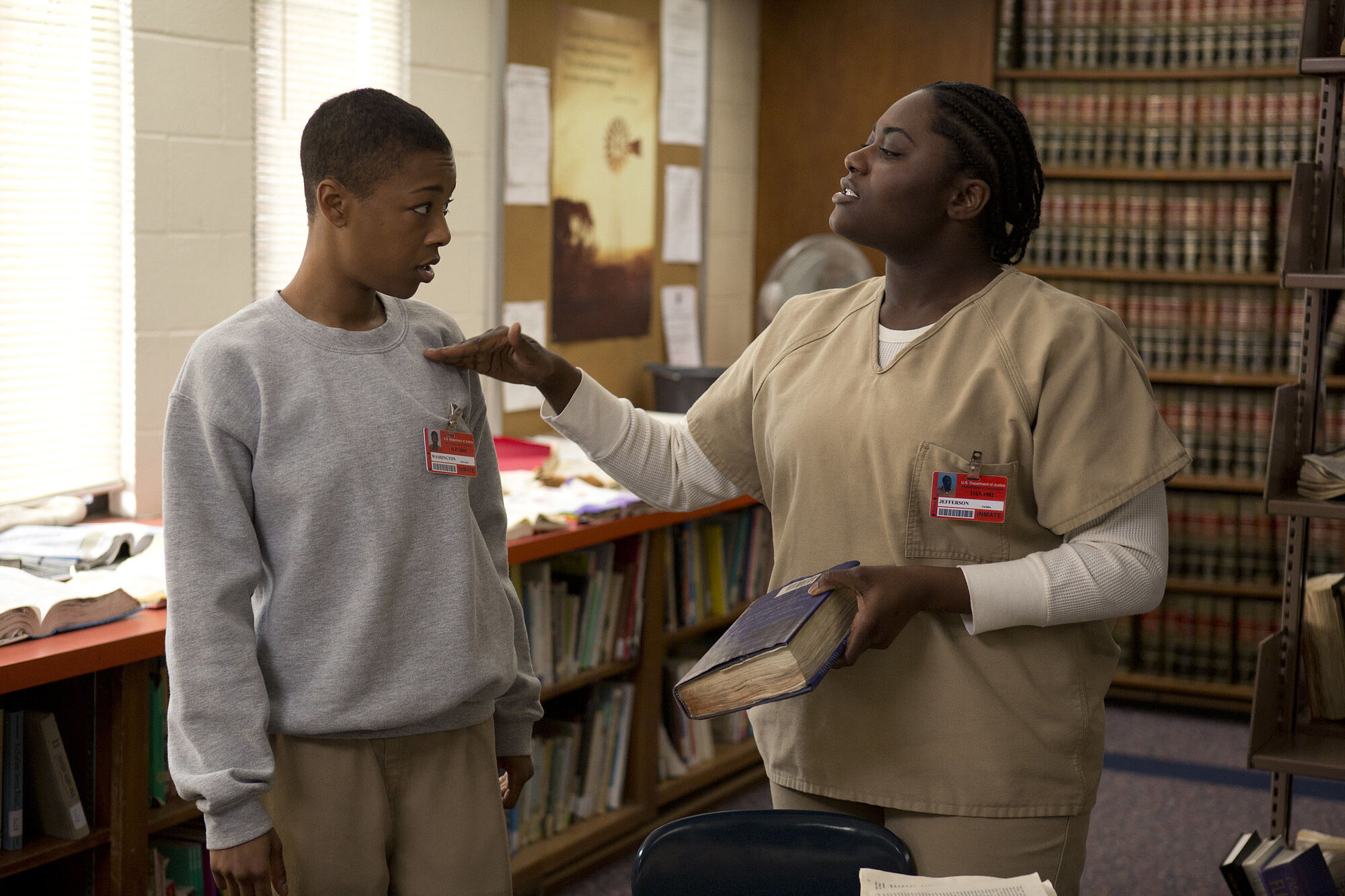
What do you hope TV creatives take away from OITNB, the stuff to do more of and the stuff to never do again?
Valerie Anne: I hope they never “preach to the choir” again. I hope they don’t try to teach their audiences lessons that their audience knows all too well. Tell our stories, but don’t networksplain our stories. Find that fine line and never, ever cross it. I hope the success of this shows gives more networks courage to green light stories that center around women – women of color, trans women, big women, all women – even if they’re not shiny and perfect. I hope it leads to more queer content nestled neatly into ensemble stories without being a Very Special Episode About Queerness.
Drew: I truly believe all the problems of Orange is the New Black could have been solved if their writers room reflected their characters. I’m all about hiring the best possible writers. But unlike Jenji Kohan, I don’t believe that means hiring the best writers I personally know or agents were quick to recommend. It’s not just about fixing mistakes. If a more inclusive writers room had existed, the actual moment by moment quality would have improved. It would have been more specific and specificity leads to better art.
Carmen: EVERYTHING THAT DREW SAID!! 🙌🏾 The glaring whiteness of OITNB’s writing room – and their stubborn, bull-headed refusal to fix it for so long – should be their most damning legay. That’s not a small point, and I hope that future writers and showrunners never make Jenji Kohan’s mistake again. If you’re commited to telling the stories of queer women, trans women, women of color – then those stories begin with the writers, not just the faces on the screen.
Natalie: Absolutely. It’s also interesting to juxtapose how the writers’ room was structured compared to how the show itself was structured… because there is such a dichotomy. So many of the actors on the show, particularly the actors of color, were new faces. Aside from random appearances in the Law & Order universe, most of these actors were unknowns. I didn’t know Uzo Aduba, Danielle Brooks, Dascha Polanco or Diane Guerrero before Orange but the show was so greatly enhanced by giving these actors an opportunity and letting them shine. I hope part of OINTB’s legacy is to push other creatives to seek out new talent, particularly in underrepresented communities, and give them a chance. The talent’s there.
I only wish that Orange had taken that same philosophy into the writers’ room.
Drew: I also think artists making work that’s political should really think about who they’re making their work for. Is the goal to teach privileged people a lesson and traumatize those you’re supposedly helping in the process? Is it worth it? Is it even most effective? I’ll fully admit that when I started watching Orange I only vaguely knew about the prison-industrial complex. Those first three seasons did inspire me to do more research. And that shows how powerful television can be even when it’s as flawed as Orange. But I question anyone who wasn’t moved to do this research until Poussey’s death. Anyone who required that level of grotesque tragedy to care about these issues was not worth winning over. I deeply believe that television should first and foremost be for the people the stories are about.
That said I think the show proves how interested people are in seeing stories about women, about people of color, about trans people, about people who are lower and middle class, about people who have had a full range of human experience. Because the vast majority of us fit into one or more of those categories.
Carmen: To that point, I also think that Orange is the New Black proved that you can let your actors be activists. I know I’ve spoken about her before, but I’m not just thinking about Laverne Cox’s advocacy for trans women at this moment. Diane Guerrero (Maritza) has been a vocal activist for the DREAM ACT and undocumented immigrants. Danielle Brooks became very vocal about body positivity. Uzo Aduba, Samira Wiley, Natasha Lyonne – all have used their mic to better serve communities that are otherwise left behind.
Riese: Once again as the last person to contribute to this roundtable, my points have already been made! As Drew said, “the problems of Orange is the New Black could have been solved if their writers room reflected their characters.” I was disappointed that in mainstream criticism, Poussey’s death was largely treated as a successful storyline when it ABSOLUTELY WAS NOT.
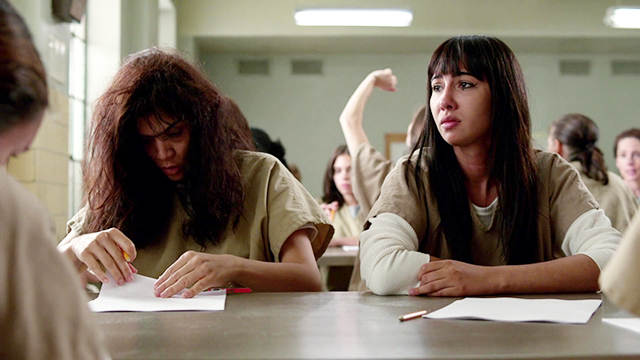
Make one prediction about one breakout star from the show.
Valerie Anne: I mean I think Samira Wiley is already becoming the queer icon we all deserve. As you may have guessed because all of my answers centered around Poussey, I think she’s very talented, and I think she can do great gay things in this world.
Drew: When the Emmy nominations came out a couple weeks ago, I met Laverne Cox’s third with a shrug. I was too distracted by the Pose snubs to realize how monumental it was that Cox getting a nomination feels… normal. It’s no longer a headline about a trans first. She’s just an actor being recognized for her work. I’m thrilled how many movies she’s going to be in over the next couple years and I know it’s just a matter of time until she moves from supporting to lead. We can roll our eyes at the “transgender tipping point” but it’s impossible to overstate Cox’s influence as a public figure. Now I sort of just want to see her be an actor. Because she’s a really, really great one.
I also predict that I will continue to have crushes on basically the whole cast.
Carmen: Hahahaha. Big Same! ( I hope that Samira Wiley and Laverne Cox know they’re never getting rid of me now. It’s far too late.)
Natalie: This is a tough question because, honestly, it could be any of these women. There was just so much talent in this cast. I will say, though, that if, ten years from now, Uzo Aduba isn’t ¾ of the way to an EGOT, I’d be shocked. It’s hard to believe that, just before she got the call for Orange, she was ready to walk away from acting entirely. She is brilliant and with OITNB now behind her, I can’t wait to see what she does next.
Heather: Maybe I can manifest this: Samira Wiley headlines a TV series that deserves her and it brings home a wheelbarrow full of trophies.
Carmen: Yeah, I think it’s too hard to predict a “breakout” because they’ve all already become breakouts. So many women of color who maybe wouldn’t have otherwise gotten a chance now have the world as their oyster. When you start running down the show’s large cast – it boggles the mind. On some level, I still can’t believe we were all here to witness it.
No but seriously, I predict that we will all be here again in ten years when they reboot this show. That’s the one thing I can count on.



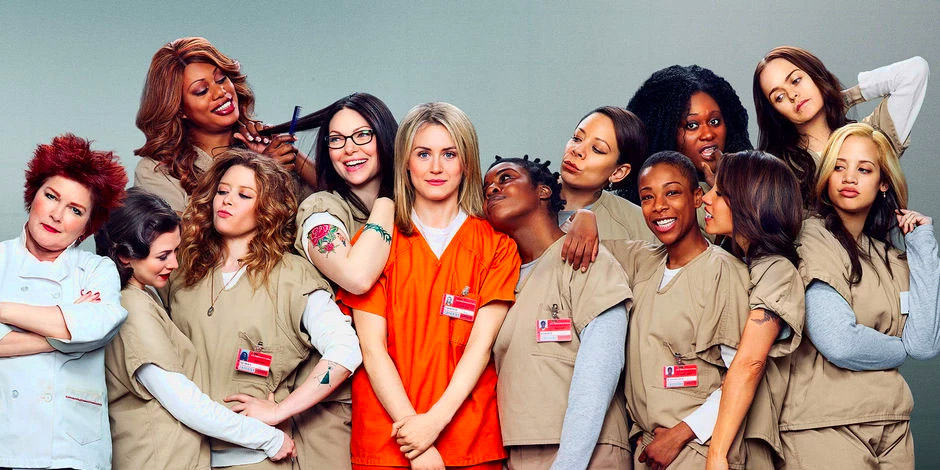




Comments
So, far I haven’t heard of a reboot of Weeds with Mary Louse Parker plays a lesbian(and not wlw until out of prison). So, maybe Jenji still hasn’t run out of ideas?
I am still watching OTINB because as others have said I generally finish a show I started and I want to see how this ends.
I stopped after season 3. Partly I lost my free netflix for a while, partly I couldn’t handle what happened to Laverne Cox.
I really appreciate this round table for giving a chance to reflect on what a massive impact this show has had, even with all its flaws.
I also stopped watching after Poussey. I tried to start season 4 but it felt clear that they weren’t going to do her story anything resembling justice and I just couldn’t. In general I connect very strongly to characters, but I think Poussey’s might be the only onscreen/fictional death that I’ve ever felt something close to real grief over, or that felt traumatic. I’d been frustrated with elements of the show for awhile but that was too much.
But even with all that, I loved it for a reason before I couldn’t keep watching. The characters were rich and deep and diverse in so many ways. I adored the cast and still do. I was one of those people who found this site because of recaps. In addition to everything that’s already been said, I’m grateful for that.
I also stopped watching after season 3 but really appreciate everyone’s perspectives
I stopped watching after season 4. For obvious Poussey related reasons. It might have been right before that season or right after that I discovered Wentworth. Wentworth is leaps and bounds better than OITNB and I have never looked back. I can’t wait for that new season
I couldn’t watch anymore after Bea died. Is it actually still good after her death?
The only spoiler I had for the fourth season was that a character dies and it’s traumatic. Nothing could have prepared me for what they did to Poussey and the black and brown community through that scene and what followed. I’m still angry thinking about it. I have never grieved a character’s pointless death more and I stopped watching after that season.
BUT… OITNB gave us the most talented cast of diverse women playing complex and interesting characters and I will forever be grateful for that.
Okay so I have continued to watch it. Then I spent a year working at a jail and my [foster] mom was sentenced to a minimum of 15 years in prison (at a particularly shitty prison). And I couldn’t stomach re-watching any of it. Seriously, it made me nauseous, because it made it so much more real and it just…ugh. So anyway, now I work in prison diversion/re-entry (in a therapeutic, outpatient setting) and I absolutely adore my job. But again, OITNB continues to be so goddamn REAL for me. Raw. And I am so scared of this season. There’s no hopes to cling to when this ends. Ugh. I hope the writers handle it all well. I know that to write it realistically would mean that justice doesn’t always come, and it certainly doesn’t come swiftly. But still…I need for Daya and Taystee to find peace. And get justice. And be happy. The fact that that probably won’t happen messes with my head just a little bit.
For breakout stars I would go with Diane Guerrero. I’ve seen her doing so many things since “Orange is the New Black”. “Superior Donuts”, “The Doom Patrol”, and something else. I was actually afraid that she wasn’t going to come back for the final season and that Flaca and Maritza would be separated forever.
Not gonna spoil anything, just gonna say that I am not at all satisfied with Flaca/Maritza’s ending.
I agree about Uzo Aduba’s EGOT
Big same. She’s absolutely brilliant.
This round table was really useful! I’ve been so mad at this show ever since they killed Poussey that I left and never watched it again (I don’t even remember watching the last episode of season 3).
It’s helpful to be invited to consider the legacy the show did leave on the rest of the tv landscape.
really interesting and thoughtful roundtable, thank you!
(I also stopped watching after Poussey’s death)
I never watched OITNB at all LOL ! Prison dramas just don’t do it for me. Perhaps prison reminds me too much of boarding school. The uniforms, the lousy food, the rickety iron beds, the guards/nuns… whew, where’s my therapist’s number again ?
For sure just reading about Poussey’s death nailed the door shut for me.
Be that as it may, I do like the name, “Poussey”, and it was fun to see it so frequently in headlines. It makes me absolutely giggle-snort every time.
Oh then you missed Wentworth
Yes, I must admit, Wentworth is _not_ on my list of things to watch. Even though I hear great things about it !
Accent à droite!